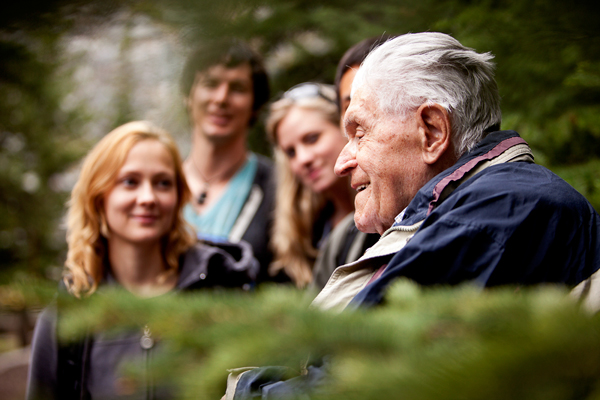Leveraging the Social Capital of Aging Adults through Volunteering
When someone pictures generations connecting through volunteering, a common image is of a teenager or young adult keeping elders company in a nursing home. While that image mirrors a popular convention, there are great opportunities involving a different approach—one focused more on channels to leverage the talent and skills of older adults.
On the front line of groups working to champion this new brand of volunteerism is the Stanford Center on Longevity, one of the leading research centers focused on longevity nationwide. Through creating opportunities for seniors to use their accumulated human capital to benefit society at-large, the Center on Longevity hopes to re-invent the traditional conception of volunteering and older adults. The Center’s work builds on research pointing to the benefits of volunteering for older adults and all other parties involved. Programs just need to find the “sweet spot” in a retiree’s transition from the workforce to effectively recruit them because workers who volunteer prior to retirement are much more likely to continue after retiring.
By many accounts, society’s traditional notion of “old” age is dated—and the research agrees. In 2015, the International Institute for Applied Systems Analysis and Stony Brook University made waves when they published a report positing that, as human life expectancy increases, the aging process slows. Warren Scherbov, the author of the report, observed that 60, and not 45, could be regarded as the new middle age. Considering the average age to enter retirement in the U.S. is 63, volunteering offers a way to stay meaningfully engaged for many seniors living out the remaining decades of their lives. On top of all the benefits volunteering presents to communities, unpaid altruistic work goes a long way in improving volunteers’ well being. Studies suggest that those who volunteer live longer, healthier, more-fulfilled lives.
In their 2017 Better Government competition proposal, the Center on Longevity outlined their pilot program to promote senior volunteering. Through its close ties with senior volunteering organizations, including the Encore Boston Network— a 2017 Better Government awardee and part of the larger network, Encore.org—the Center is helping recent retirees and employees who work for Santa Clara County (SCC), California. With a robust group of 250 volunteers participating in the pilot, the SCC Volunteerism Project hopes to develop the best methods to recruit, retain, and benefit older adults interested in volunteering.
Adult volunteers 65 and older spend nearly twice as many hours on average participating in unpaid altruistic work than the rest of the population while the rate of volunteerism among seniors typically hovers around 25 percent, which reflects the average for the entire adult population. However, a survey conducted by the Stanford Center on Longevity on SCC employees found that 80 percent were interested in volunteering but lacked information on how to do so. Considering that many county employees enter retirement in their early 50s, the Stanford Center on Longevity recognized this population as a golden opportunity to test what methods entice retirees to volunteer.
The Stanford Center on Longevity has established a model that they hope can contribute to widespread adoption of similar programs nationwide. Replication in Massachusetts would depend on securing funding for two categories: coordination and advertising—something that Encore Boston Network in partnership with the Department of Children and Families has been working towards as well.
Older adults entering retirement are a previously untapped resource. The younger generation could use the social capital of older adults more than ever and, as lifespans increase every year, today’s older adults are poised to create substantive change in their communities post-retirement. Stanford Center on Longevity is laying the groundwork for a future where retirement is not simply an exit from the workforce but a shift to something just as, if not more, fulfilling: volunteering.




Leave a Reply
Want to join the discussion?Feel free to contribute!